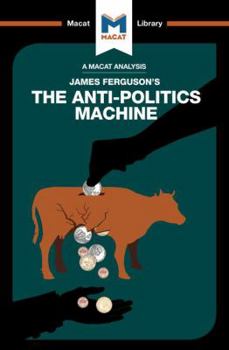An Analysis of James Ferguson's the Anti-Politics Machine
Select Format
Select Condition 
Book Overview
The Anti-Politics Machine (1990) examines how international development projects are conceived, researched, and put into practice. It also looks at what these projects actually achieve. Ferguson criticizes the idea of externally-directed 'development' and argues that the process doesn't take proper account of the daily realities of the communities it is intended to benefit. Instead, they often prioritize technical solutions for addressing poverty and ignoring its social and political dimensions, so the structures that these projects put in place often have unintended consequences. Ferguson suggests that until the process becomes more reflective, development projects will continue to fail.
Format:Paperback
Language:English
ISBN:1912128608
ISBN13:9781912128600
Release Date:July 2017
Publisher:Macat Library
Length:100 Pages
Weight:0.24 lbs.
Dimensions:0.2" x 5.1" x 7.8"
Customer Reviews
0 rating





